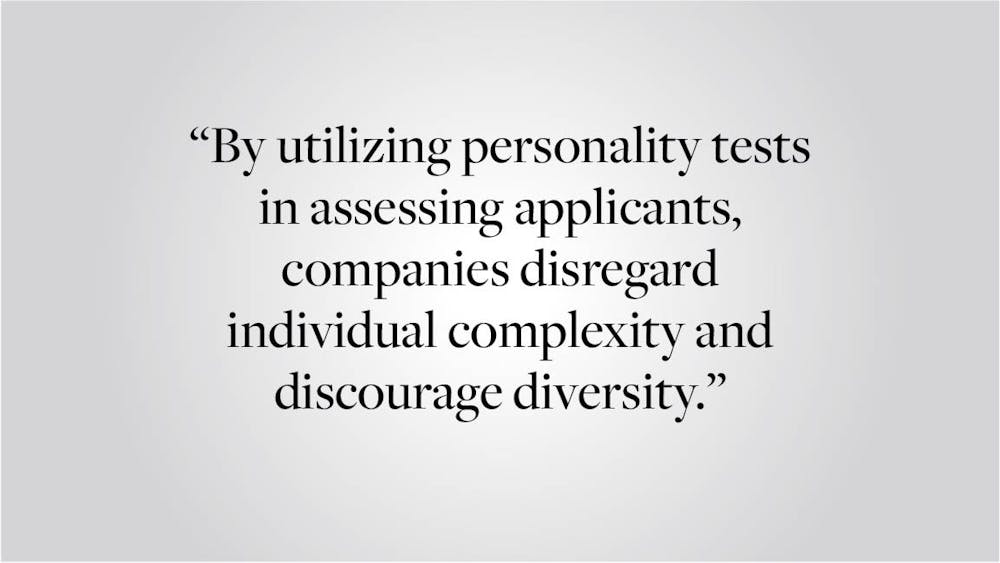While applying for post-graduation jobs this semester, I’ve stumbled across a baffling aspect of the application process for some companies: a personality test. When the company I applied to requested I fill out a short character assessment, I assumed the test would consist of relevant questions, like “Do you prefer working in loud or quiet spaces?” or “Are you happier working from home or in person?” Questions like these provide tangible insights into the working habits of applicants. Unfortunately, my faith was misplaced — they were, in fact, attempting to gauge my personality, a feat that is as ambitious as it is unsound. Most personality tests have long been considered pseudoscience by psychologists, and their inclusion in hiring processes forces applicants into uncomfortably-invasive positions. By utilizing personality tests in assessing applicants, companies disregard individual complexity and discourage diversity.
Personality tests have increased in popularity as a recruitment tool in recent years, possibly by as much as 20% annually as of 2011. However, the scientific validity of these tests is dubious, at least for the purposes of hiring. Personality tests that sort individuals into categories, most notably the Myers-Briggs Type Indicator, are particularly ridiculed by the scientific community. Even personality tests that rate test takers on individual character traits aren’t necessarily a valid indicator of applicant viability. First of all, personality tests don’t account for a test taker’s outside circumstance, like stressful situations. Though the Big Five personality test is respected among some academics, pushing the tests as effective indicators of later job success is a misrepresentation of research. While some research correlates Big Five scores with certain outcomes, correlation does not equal causation. Individuals can change their personality traits through conscientious goal setting.
Personality tests are sometimes used in applications to determine an applicant’s cultural fit. However, research has raised questions as to whether personality-test results are a good predictor of cultural fit. Assumptions about which personality traits best serve specific roles could also limit the diversity of certain fields. Furthermore, personality tests can inadvertently promote disability discrimination by measuring traits such as introversion/extroversion, positivity, intensity and neuroticism. In some cases, using certain personality tests for hiring processes may even violate the Americans with Disabilities Act of 1990.
As someone with generalized anxiety disorder, I felt extremely uncomfortable when the personality assessment I took asked whether I become anxious in certain situations. The presence of these kinds of questions caused me to wonder whether the company might use my anxiety symptoms to take me out of the running. Thus, I became torn between my desire to be truthful and my fear that answering honestly would leave me vulnerable to discrimination. Including questions about anxiety both violated my rights as a disabled person and disregarded the fact that I’ve learned to persist through my anxiety.
Personality tests remove context that is needed to truly understand human behavior. No multiple-choice question can account for contingencies and factors that impact the answer. For example, I was asked to mark whether “I become aggressive when I believe people are wrong,” a statement that does not specify what wrong means. Is the person who I believe to be wrong saying that Oxford commas are unnecessary or are they saying women aren’t cut out for the workplace? My answer to this question could easily be both true or false. When both answers could easily be true, applicants are left agonizing over which answer the company wants, leading some individuals to answer personality tests based on which answers are socially desirable as opposed to which they resonate with the most.
The reality is, no multiple-choice personality test can provide as much insight as a structured interview. Companies say that they want to hire unique individuals, yet they disregard individuals’ complexity in favor of efficiency.
This isn’t to say that personality tests should play no role in job selection. However, their usefulness applies more to applicants than to hirers, as they may serve as jumping-off points for self-reflection. If companies provided a personality test to applicants without actually reviewing the results, they could encourage reflection as opposed to performativity in their applicants and potentially weed out those who realize that they wouldn’t like the job. Unfortunately, using personality tests to direct certain applicants to specific jobs while disregarding others places an unfair burden on some individuals during an already-grueling application process.
Megan Slusarewicz ’23 can be reached at megan_slusarewicz@brown.edu. Please send responses to this opinion to letters@browndailyherald.com and other op-eds to opinions@browndailyherald.com.





